Spinosaurus is one of the most popular dinosaurs in figure form. The dinotoycollector website has more than 100 entries for the genus, and collectively we’ve reviewed more than 40 here on the blog. For that reason, I’m not going to spend much time on the new Spinosaurus statue by Damtoys, instead focusing on the fish that was included with it. If you’re deliberating on whether to buy the dinosaur for its own sake, you probably wouldn’t have liked anything I had to say about it anyway. This statue is not a particularly good representation of the actual animal, and although it has a lot of surface detail, that detail is overlain on some really weak anatomy, even if intended as a self-consciously retro reconstruction. The result reminds me of those listicles where an artist takes kids’ doodles and makes them look lifelike while retaining the cartoonish proportions. So we’ll just leave this one in its styrofoam nest for now.
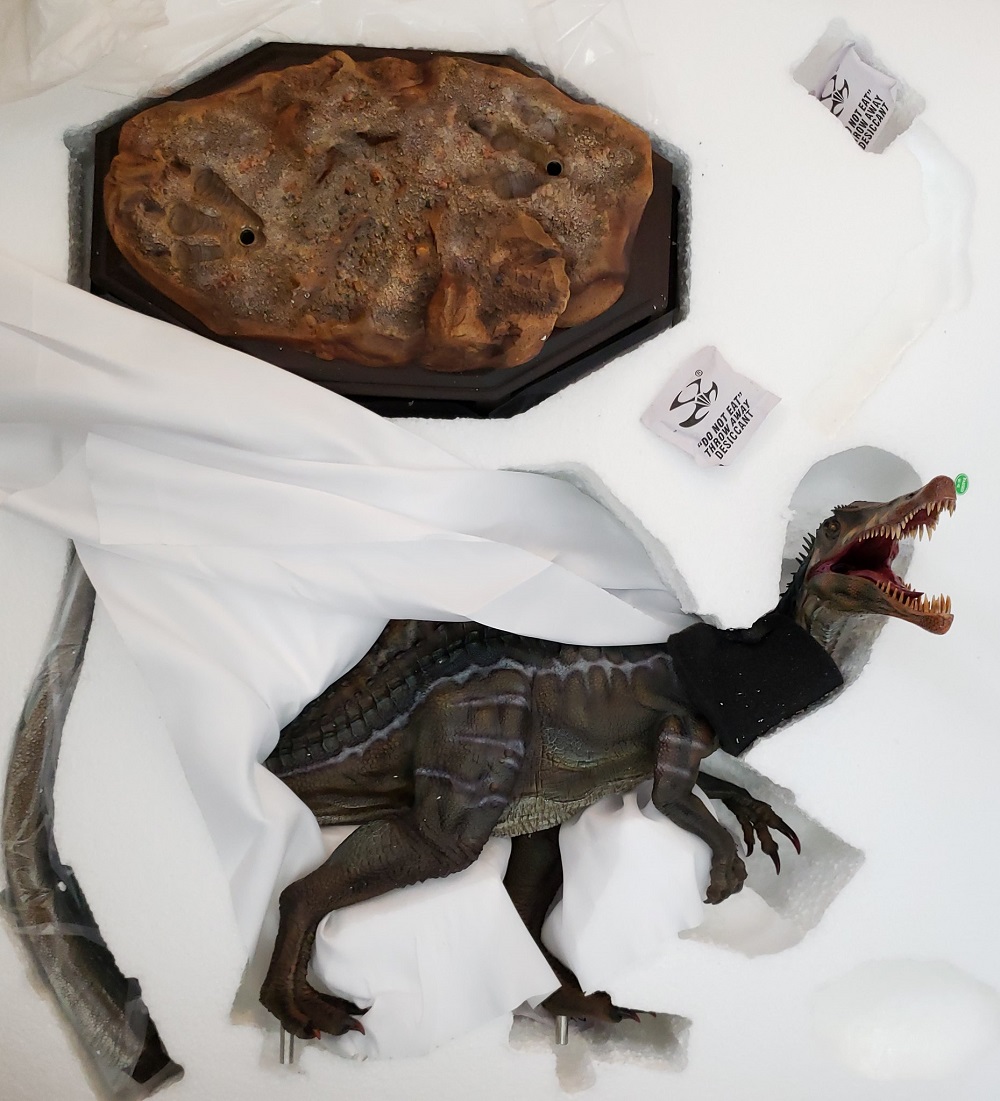
Damtoys really has their logo printed on desiccant packets.
In case you’re not familiar with Damtoys, they mostly make creepy military dolls, along with figurines for some pop culture properties. They’ve also released a few statues of prehistoric animals under the name Paleontology World. It’s probably a character flaw on my part, but I tend to bore pretty quickly of the most frequently made prehistoric taxa. These days, the best way to get me interested in a Spinosaurus is to include a fish with it–preferably not permanently fused to its jaws. Damtoys has duly included such a fish, which is identified on US distributor Sideshow’s website as a “shark.” It comes with its own polystone base and a clear acrylic dowel that fits into a hole drilled in its belly.
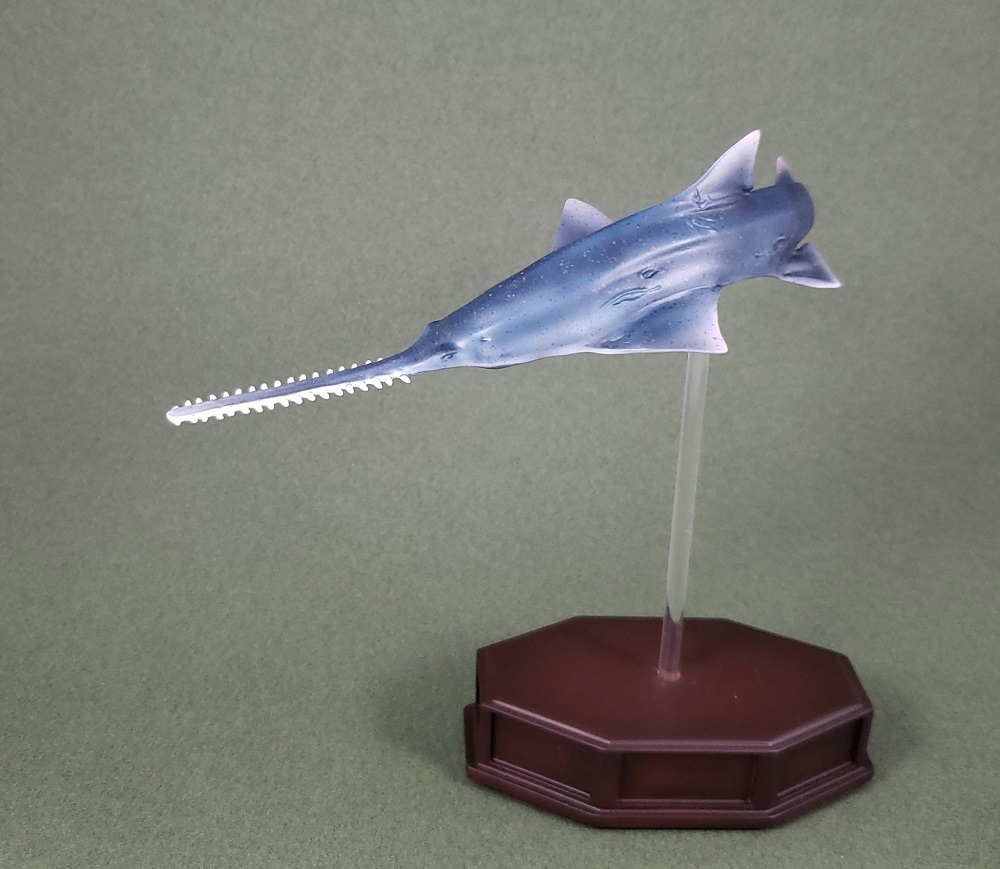
Sharks with saw-toothed rostra do exist, and they’re very distinctive, with barbels on the snout and their gills on the side of the head as in any other shark. The Damtoys fish has ventral gills; in this and other respects it resembles a modern sawfish (Pristidae) rather than a sawshark (Pristiophoridae). Trouble is, no sawfish are known from formations that yield Spinosaurus remains. ‘What about Onchopristis?’ you might ask. I think Onchopristis is probably what they were going for here, but it wasn’t a sawfish at all! It was part of an extinct group called Sclerorhynchoidei, which were perhaps ecological predecessors to sawfishes, but according to a 2019 analysis (paywall) were more closely related to modern skates.
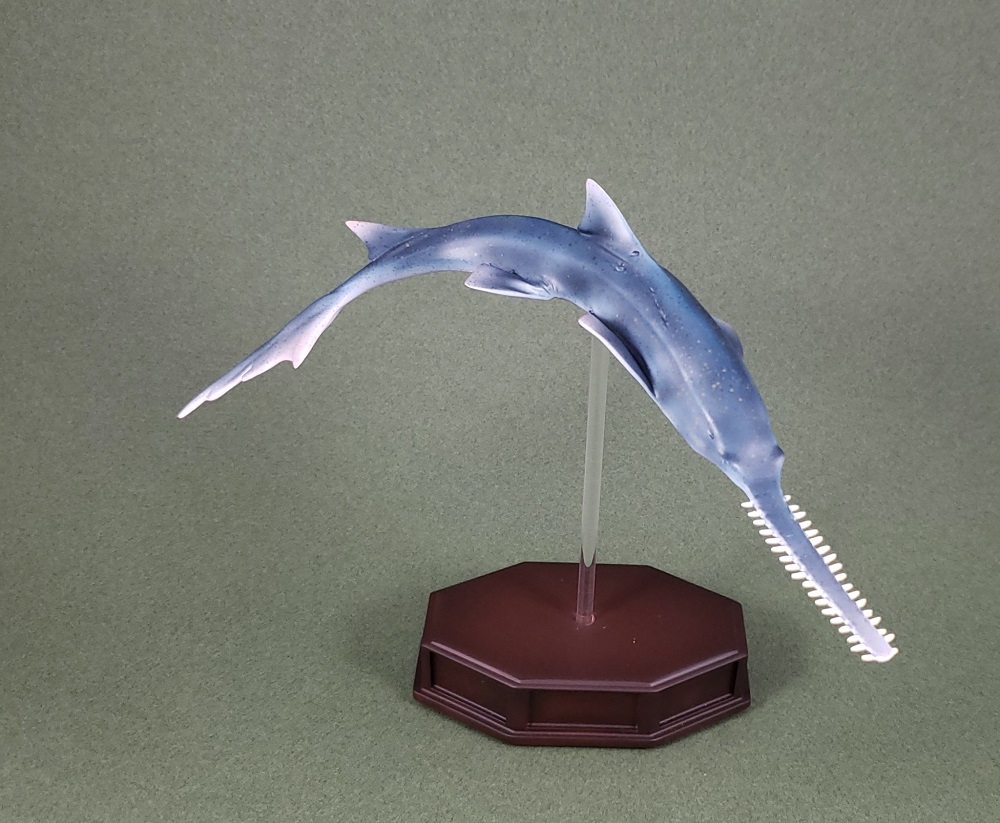
The sculptor, Yuxie Zhou, has real skill. I’m guessing that someone told them to sculpt a sawfish and they did so. It’s a half-decent sawfish. On the upper side, it’s an uneven slaty gray color with tiny blotches of darker gray and medium tan. The underside is paler, and the fins and mouth are highlighted with a pale pink. The teeth are painted off-white, and the paint job is reasonably neat. One of the teeth has a shred of what looks like molding flash. Oddly, the eyes are sculpted but not painted. Overall, for how expensive this statue was, I think the paint job should be better.
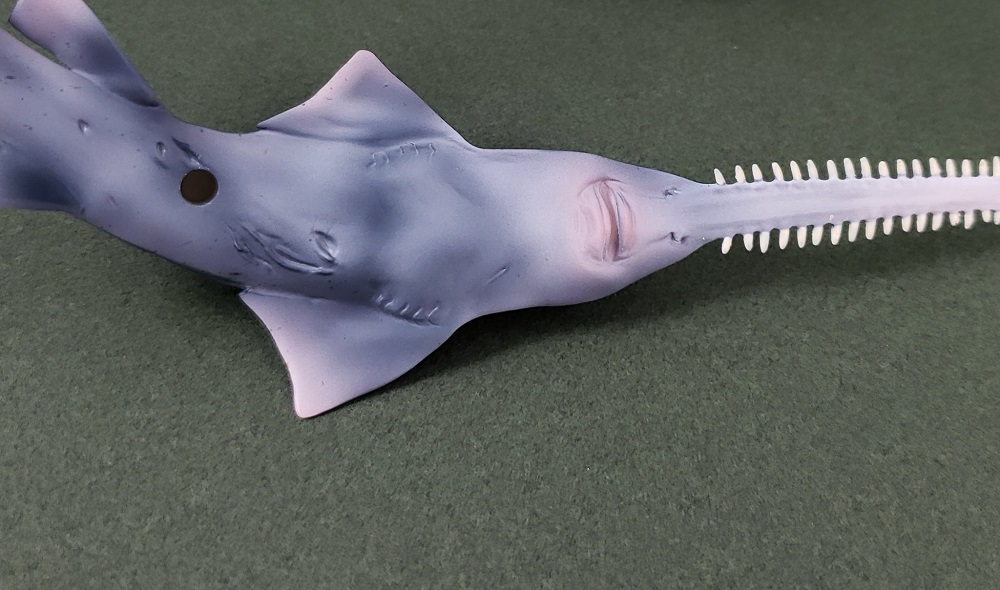
The body has gouge marks all over it, but unlike the rather wilted prey of the PNSO Spinosaurus, there isn’t any blood coming from the wounds. I never bothered to unpack the main statue, but if the promotional photos are anything to go by, the injuries don’t seem to correspond to points of contact with its teeth or claws. The caudal fin is at an astonishing 90 degree angle to the second dorsal fin. Cartilaginous skeletons are more flexible than bony ones, and I get that this animal is supposed to be in the throes of predatory agony, but this amount of twisting over such a short distance is probably not possible without visible ruptures.
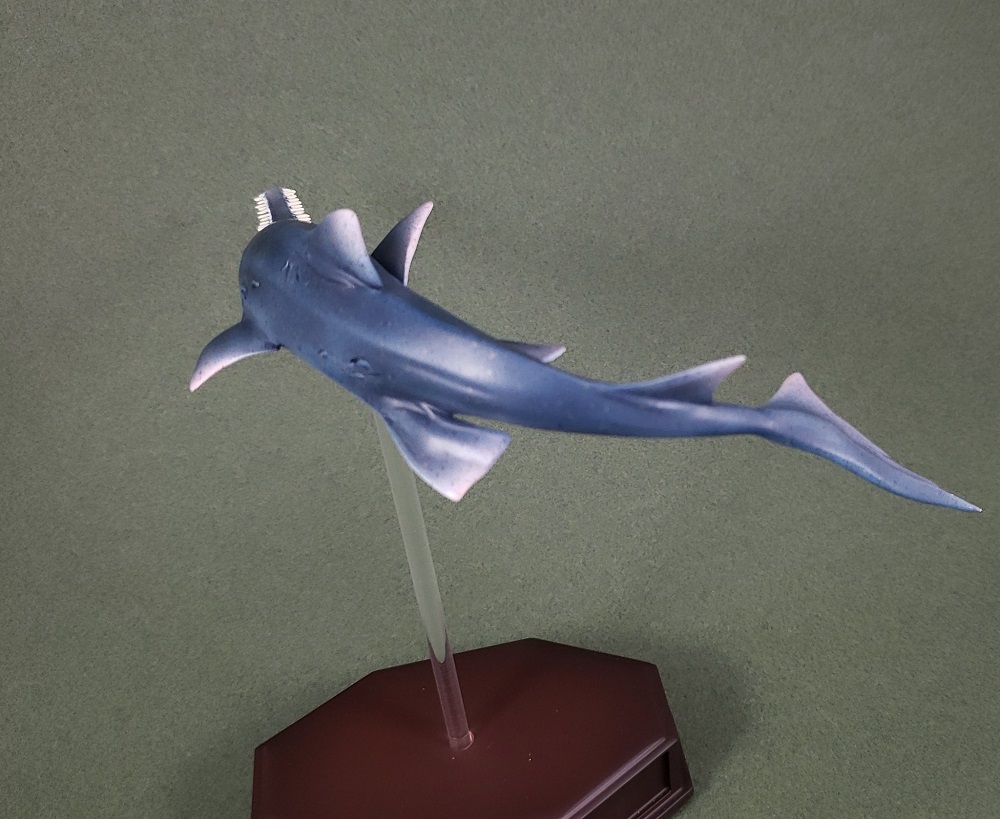
Now let’s talk about why this can’t be considered a reasonable representation of Onchopristis, or any other fish that Spinosaurus is likely to have coexisted with. Starting with the snout, sclerorhynchoids had a tapering rostrum rather than the parallel-sided one you see on modern sawfish. Some of them had roughly equal-sized teeth, but Onchopristis in particular had very uneven teeth. Moreover, those teeth bore wicked barbs, as opposed to the conical teeth of a sawfish. Onchopristis also had bristly barbs at the tip of the snout, which are completely absent here. Finally, like the living thornback skate, Onchopristis had spiky denticles on its back, which should be visible at this scale (roughly 1:40 for a large individual) but which, again, are absent.
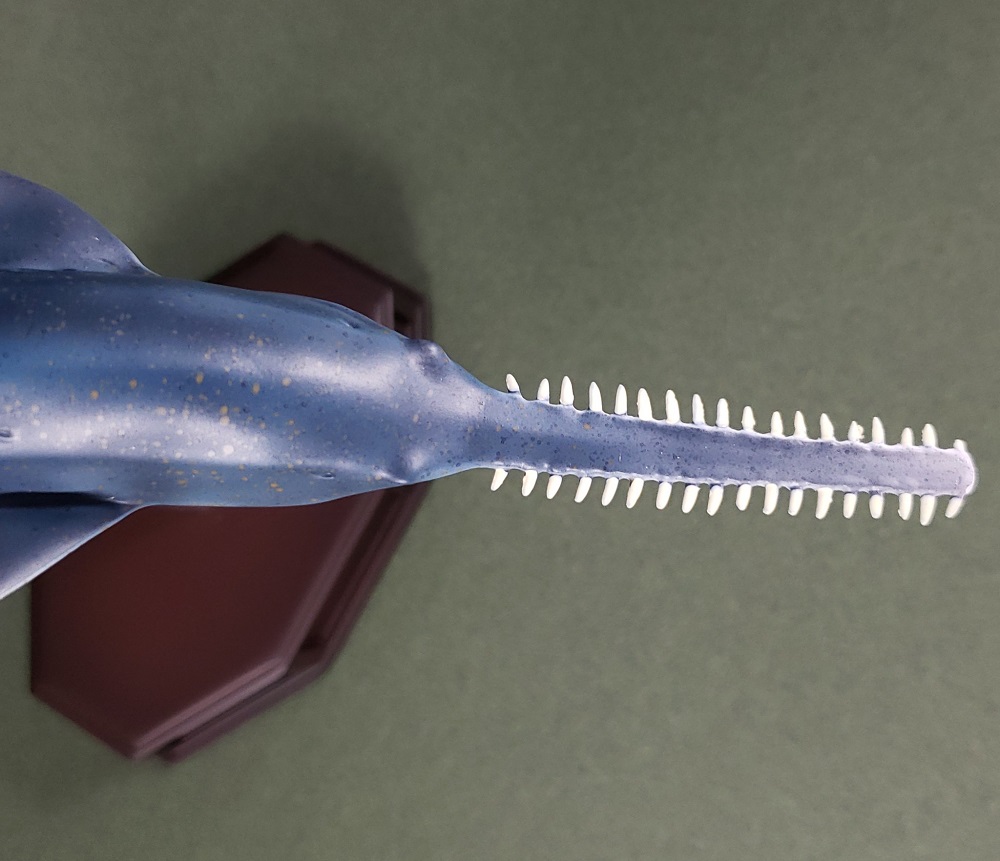
Onchopristis probably had very large pectoral fins, with smaller pelvic fins immediately behind. The dorsal fins would have been set far back on the body, close to the tail. This figure has the fin placements and proportions of a sawfish, which, again, achieved the long toothy snout morphology independently, a nice example of convergent evolution. Sclerorhynchoids did it first! And they did it just a little differently, differently enough that this figure just really fails as a representation.
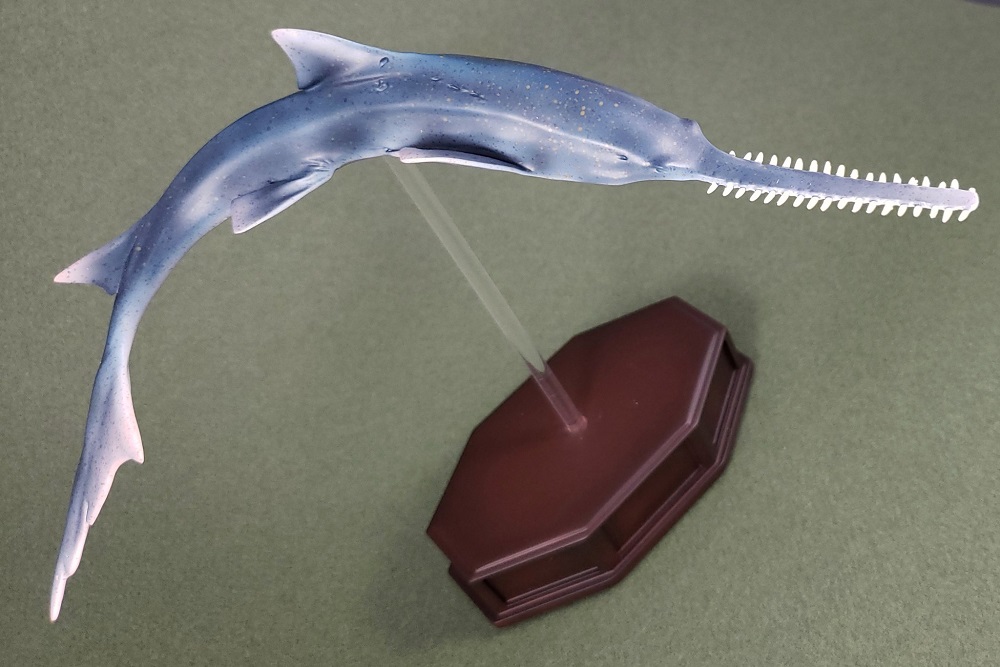
Compare to this drawing, which still shows the rostrum too straight, but which gets the other proportions basically right.

I can’t recommend this or the dinosaur it comes with, especially with a price tag of nearly $500 US. It’s a weak piece and an abysmal value, and belies the name “Paleontology World.” I bought it for the fish, although now that I have it in hand I don’t really care for the fish much either. Maybe, just maybe, the next time a company attempts Onchopristis, they’ll do a few minutes of research. And don’t worry about me: I’m confident I’ll recoup the cost of this purchase one day, as the market for high-end statues of things that look almost nothing like actual dinosaurs is an insatiable one.
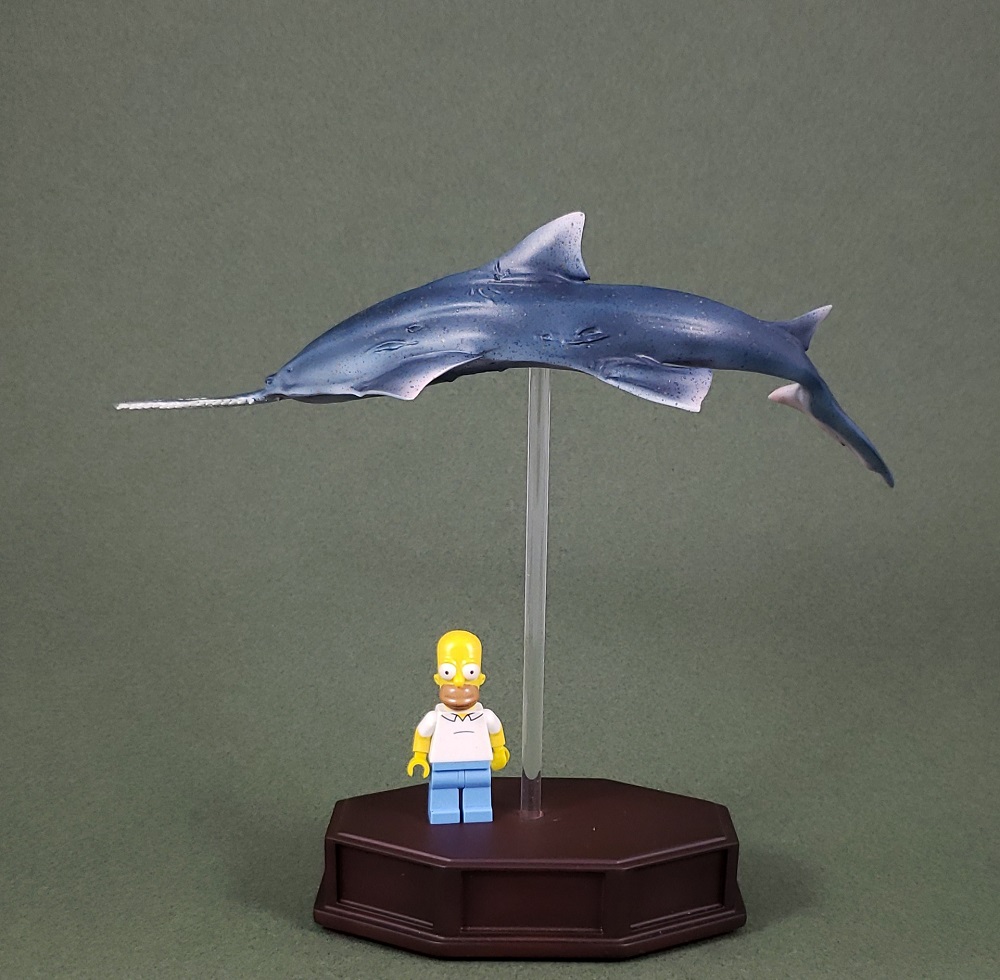
Disclaimer: links to Ebay and Amazon on the DinoToyBlog are affiliate links, so we make a small commission if you use them. Thanks for supporting us!




Is there any chance you could post some photos of the Spinosaurus? Looking to maybe purchase it. Thanks!
Sorry to disappoint, but I sold the Spinosaurus about two years ago. It took up a lot of space!
Such a shame. I’d love a decent onchopristis. But, not unexpected, I’ve never seen a statue from damtoys that looked appealing.